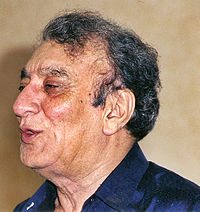Ahmad Faraz
| Ahmad Faraz احمد فراز | |
|---|---|

Ahmad Faraz, Toronto 2005
| |
| Born | Syed Ahmad Shah Ali 12 January 1931 Kohat, NWFP, British India |
| Died | 25 August 2008 (aged 77) Islamabad, Islamabad Capital Territory, Pakistan |
| Pen name | Faraz |
| Occupation | Urdu poet, Lecturer |
| Nationality | Pakistani |
| Ethnicity | Sayyid |
| Citizenship | Pakistani |
| Education | MA Urdu, Persian |
| Alma mater | Peshawar Model School Peshawar University |
| Period | 1950–2008 |
| Genre | Urdu Ghazal |
| Subject | Romance, resistance |
| Literary movement | Progressive Writers Movement/Democratic Movement |
| Notable awards | Hilal-e-Imtiaz Sitara-i-Imtiaz Nigar Awards |
| Children | Saadi, Shibli and Sarmad Faraz |
Ahmad Faraz (Urdu: احمد فراز, born Syed Ahmad Shah (Urdu: سید احمد شاہ) on 12 January 1931[1] in Kohat,[2][3] died 25 August 2008) was a Pakistani Urdu poet. He was acclaimed one of the modern Urdu poets of the last century. 'Faraz' is his pen name, (in Urdu takhalus). He died in Islamabad on 25 August 2008.[4][5] He was awarded Hilal-e-Imtiaz, Sitara-i-Imtiaz and after his death Hilal-e-Pakistan by the government.[3]
Early life[edit]
Faraz was born in Kohat,[3] (then British India) to Syed Muhammad Shah Barq. His brother is Syed Masood Kausar.[6] He moved toPeshawar with his family. He studied in famous Edwards College, Peshawar and received Masters in Urdu and Persian fromPeshawar University.[7]
During in college life, Faiz Ahmad Faiz and Ali Sardar Jafri were his best progressive poets, who impressed him and became his role models.[8] Ethnically a Pashtun Syed, Ahmed Faraz studied Persian and Urdu at the Peshawar University. He later became lecturer at the Peshawar University.
Career[edit]
Served as Chairman National Book Foundation Islamabad
Literary[edit]
Faraz has been compared with Faiz Ahmad Faiz,[7] holds a unique position as one of the best poets of current times, with a fine but simple style of writing.[6] Even common people can easily understand his poetry.
In an interview with Rediff he recalls how his father, once bought clothes for him on Eid. He didn't like the clothes meant for him, but preferred the ones meant for his elder brother. This lead him to write his first couplet:
Sab kay waste laye hein kaprye sale se
Laye hein mere liye qaidi ka kambal jail se
(He brought clothes for everybody from the sale)
(For me he brought a blanket from jail)[9]
Political[edit]
Faraz was arrested for writing poems that criticised military rulers in Pakistan during the Zia-ul-Haq era. Following that arrest he went into a self-imposed exile.[5] He stayed for 6 years in Britain, Canada and Europe before returning to Pakistan, where he was initially appointed Chairman Pakistan Academy of Letters and later chairperson of the Islamabad-based National Book Foundation for several years. He has been awarded with numerous national and international awards. In 2006, he returned the Hilal-e-Imtiaz award he was given in 2004.[7]
He claimed his current writings and said: "I now only write when I am forced to from the inside."[citation needed] Maintaining a tradition established by his mentor, the revolutionaryFaiz Ahmad Faiz, he wrote some of his best poetry during those days in exile. Famous amongst poetry of resistance has been "Mahasara". Faraz was also mentioned by actor Shahzada Ghaffar in the Pothwari/Mirpuri telefilm "Khai Aye O".
Death[edit]
Faraz died of kidney failure[4] in a local Islamabad hospital on 25 August 2008. His funeral was held on the evening of 26th, by many admirers and government officials at H-8 Graveyard, Islamabad, Pakistan.[3][4]
Samples of poetry[edit]
A sample of his poetry is:
Another poetic translation of the above
Dreams do not die
Dreams are heart, nor eyes nor a breath
Which shatter and then they scatter,
Die they all, with end being nigh
List of Works/Bibliography[edit]
- Pas-e-Andaz-e-Mausam[10]
- Shehr-e-Sukhan Arasta Hai (Kulliyaat)
Collection of the following books:- Pas-e-Andaz-e-Mausam
No comments:
Post a Comment